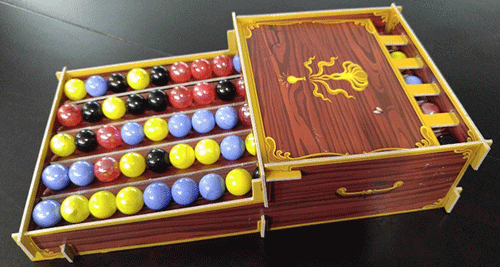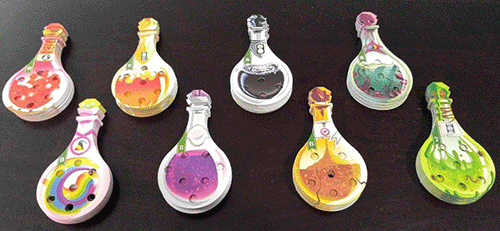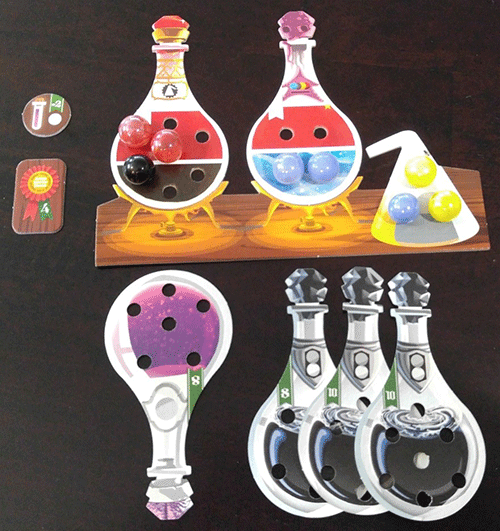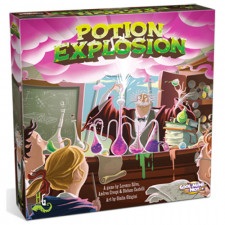Potion Explosion Review
on Oct 12, 2016
In Potion Explosion, you are students taking your final exam in your Potions class. Instead of a Scantron sheet though, you’re combining various amounts of Unicorn Tears, Dragon Smoke, Ogre Mucus, and Fairy Dandruff to pass this test. When taking ingredients from the dispenser, if any two of the same ingredients collide, an explosion occurs, which means you get all of those same-colored ingredients (and continue doing so until no more explosions occur). This whole premise is implemented by the marble dispenser, which is the heart of this puzzle-heavy set collection game. Although this is where the theme ends and the mechanisms step in it is still a wonderfully whimsical premise to a game that ends up being greater than the sum of its parts.

Potions made with only the finest ingredients.
At first glance, the marble dispenser seems like a gimmick. It seems like some physical version of one of those mildly entertaining, mostly mindless, freebie puzzle apps where you’re slamming fruit together or picking up gems. The type of game you only play while waiting in the dentist’s office. I assure you though; the marble dispenser is actually an integral part of the game. There’s a lot more thought that goes into selecting your marble than it first appears. However, the real joy in Potion Explosion is the various potion abilities.

Explosions on explosions on explosions.
There are 8 different potion types total, of which you use 6 per game. After finishing a potion, you can drink it, meaning use its ability. By doing this, you can cleverly combo, chain, and manipulate how you use and collect your potion ingredients. For example, Potion of Prismatic Joy lets you use any ingredients from your pool as any color and Balm of Uttermost Stickiness lets you take 2 or more adjacent ingredients of the same color. You get plenty of opportunities to feel smart as you carefully consider whether or not to use a potion (or several) during your turn and what the best order for doing so. On average, you compete a potion every turn or two, so you also get a satisfying sense of accomplishment throughout the game. Because you are limited to only brewing two potions per turn (as indicated by your two Bunsen burner spots), you want to make the most out of your limited resources. And if you’re really struggling to pull off that perfect explosion, you can ask the professor for help, which means pulling a single ingredient at the cost of -2 points at the end of the game. (I guess professors in wizard school deduct points when you go visit them during office hours.)

Colors more unnatural than what comes in Gatorade bottles.
On top of the points you receive at the end of the game for your completed potions, you also get skill tokens (i.e., bonus points) for completing sets of 3-of-the-same or 5-different kinds of potions. This gives you something to aim for during the game and creates some strategy in how you choose which potions to start next, considering both the type of potion as well as the required ingredients. Once the skill tokens run out, the game is over. This can happen rather quickly, so efficiency is key to knocking out as many potions as you can. However, with the limit of only two potions being able to be completed per round, this ensures no one will be able to infinitely combo ingredients and potion abilities in a way that prevents you from even getting a chance to compete.

Be sure to brew (and drink) potions responsibly
Like other pattern recognition games (e.g., Five Tribes), you can’t do much when it’s not your turn. Sure, looking at the dispenser and hoping someone doesn’t see that perfect explosion you set yourself up for isn’t a bad idea, but as the player count increases, the less likely it is that that configuration will still be there when it comes to you. This makes the game swing far more toward the tactical, rather than strategic, side of the continuum. Moreover, for those overachieving students who like to really contemplate their ingredient-potion efficiency, there can be some downtime between turns. This isn’t as bad as other offenders in this genre, but it is something that can vary based on who you’re playing with. Fortunately, the game plays well at all player counts, so if you want to keep it at a 2- or 3-player game, there’s no problem in doing so. Lastly, it’s important to note that outside some mostly unintentional screwage when selecting ingredients, this game has very little interaction. Unlike a real exam, you can watch what others are doing; it just might not be all that interesting. Ultimately, Potion Explosion’s greatest virtue is its uniqueness, especially among the crowded lightweight/family/gateway genre. And don’t underestimate how much fun it is to pull marbles out of the dispenser, hearing them clank together as they roll down to fill empty spots, and then tossing them back on top to refill. No amount of wizardry can take away that fantastic sensation. And for any digital implementation fans (like me), Cool Mini or Not included a little teaser ad for a Potion Explosion app coming soon. No other information is on the flyer, so no idea whether or not it’ll be a full game or some kind of puzzle spinoff, but I’ll be grabbing that as soon as it appears! After all, the more I practice my potions, the sooner I’ll become a wizard, right?

 Customer Support
Customer Support  Subscribe
Subscribe 




 Account
Account  Wishlist
Wishlist 

